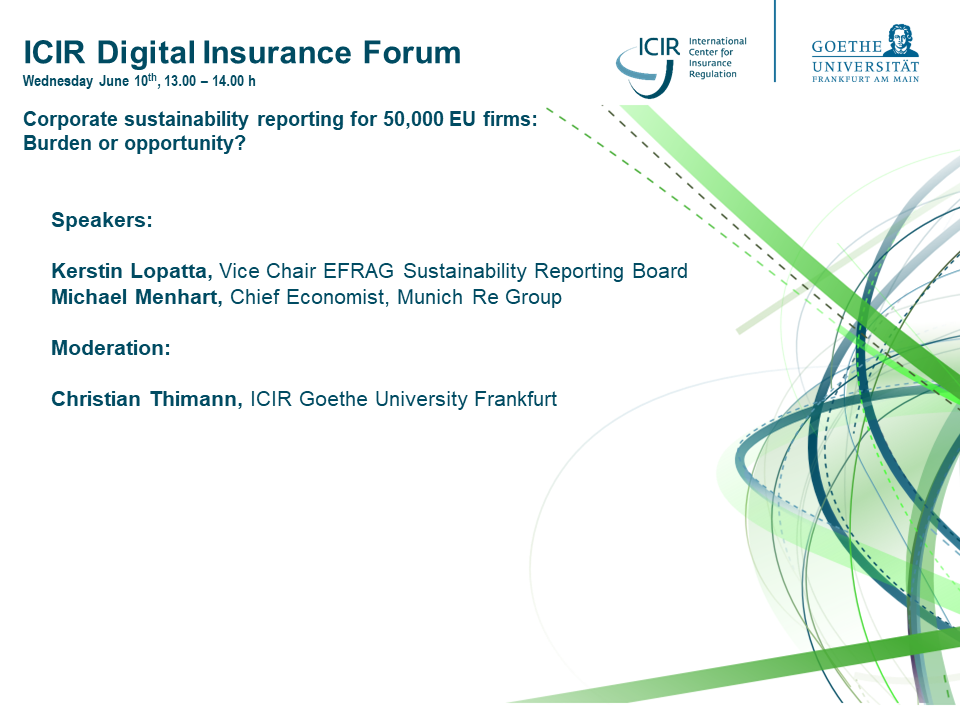Corporate sustainability reporting for 50,000 EU firms: Burden or opportunity?

Christian Thimann opened the Digital Insurance Forum 2/23 with a brief overview of the EU’s plans to introduce comprehensive corporate sustainability reporting standards for 50,000 companies. The aim of the European Sustainability Reporting Standards (ESRS), based on the new Corporate Sustainability Reporting Directive, is to put companies at the center of the journey towards a more sustainable future. In total, 11 different chapters have been designed by the EFRAG Sustainability Report Board, including aspects such as environment (e.g. greenhouse gas emissions and waste management) and the company’s workforce (e.g. proportion of employees covered by collective bargaining agreements and adequate on-the-job training opportunities).
The ICIR invited two prominent speakers on this topic: Kerstin Lopatta, Vice Chair of the EFRAG Sustainability Reporting Board, and Michael Menhart, Chief Economist and Head of Sustainability and Public Affairs at Munich Re Group.
Kerstin Lopatta provided a detailed overview of the planned Sustainability Reporting Standards, the people and bodies involved in the process, and the timeline of EFRAG's work from the first draft to the current phase of four weeks of public feedback on the first set of ESRS. Her insightful presentation of EFRAG's work was rounded off with a brief discussion of the current changes introduced in the latest version of the draft, as well as future steps regarding the ESRS.
Changing the perspective from the regulatory side to that of an international corporation subject to the proposed reporting standard, Michael Menhart’s statement provided an interesting insight into the perception of the proposed reporting standards in the insurance industry. As a reinsurer, Munich Re is subject to the ESRS but will also benefit from the increased availability of corporate sustainability data to substantiate its investment decisions. While supporting the EU's goals for greater sustainability, Michael Menhart expressed the wish for less but more meaningful sustainability KPIs and highlighted the data challenge. The key for increased ESG reporting to make a difference in the corporate world is that the data collected is (i) reliable and comparable across companies and internationally, (ii) meaningful and avoids loss of focus due to information overload, and (iii) ultimately used by investors for their investment decisions.
In the ensuing discussion, moderated by Christian Thimann, the potential burden of the ESRS on companies was further discussed. Michael Menhart expressed concern that the limited resources available for ESG projects within a company could be significantly tied up in keeping up with the increased reporting burden. This could limit the number of projects aimed at more sustainable business practices. In particular, the intensive development of a company's IT infrastructure with the sole purpose to collect the required ESG data is an often overlooked factor.
In the same vein, Alexander Ludwig, Director of ICIR, initiated a lively discussion on the cost-effectiveness of enhanced sustainability reporting standards compared to other instruments for a greener economy, such as a carbon tax. Kerstin Lopatta replied with insights into the cost calculations of the ESRS carried out by ERFAG. She highlighted some important advantages of the ESRS compared to a carbon tax, such as the broader sustainability aspect that can be addressed, for example regarding an employee-friendly workplace.
Commissioner Hester M. Peirce of the US Securities and Exchange Commission brought an important US perspective to the discussion. She raised the question in the direction of regulators setting up the increased standards of ESG reporting: Are the high expenses on sustainability reporting spent in the right place? In her experience, companies are already struggling with the less ambitious climate reporting standards in the US, which are freezing important resources and talent.